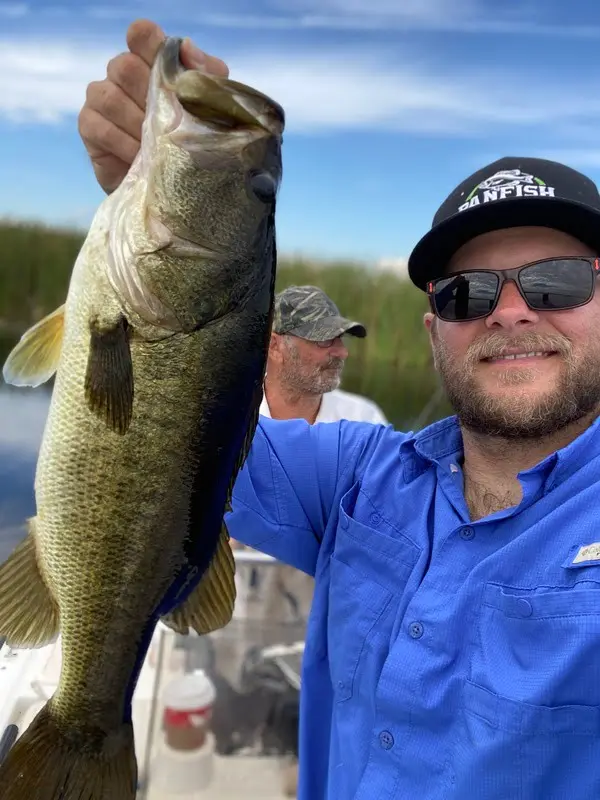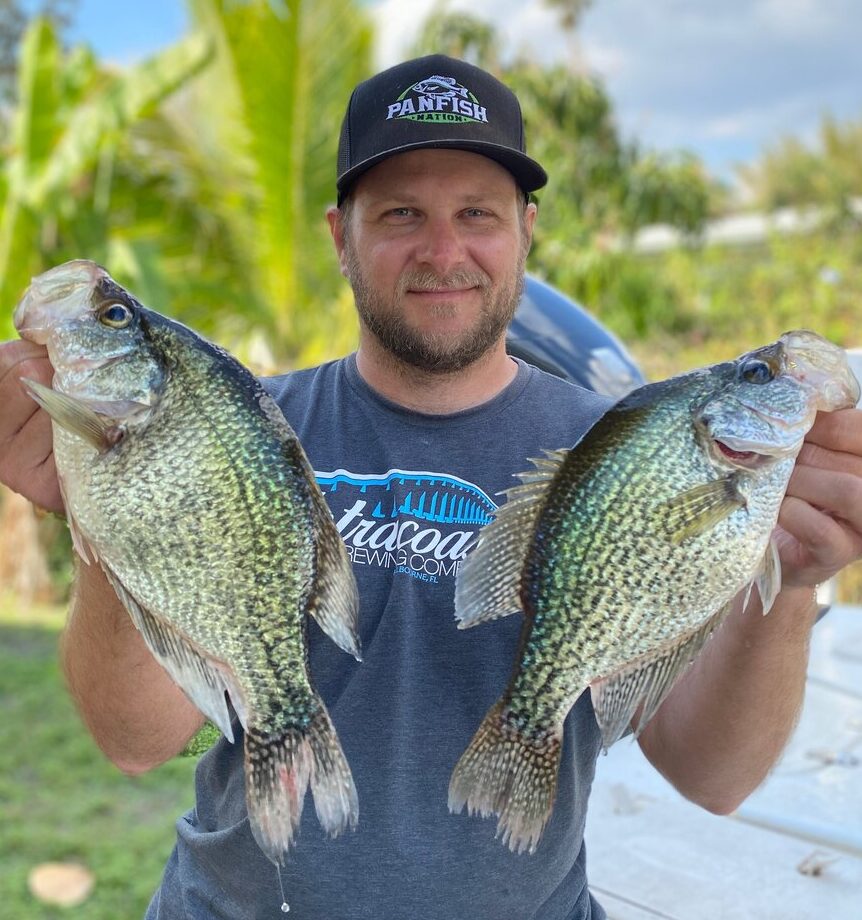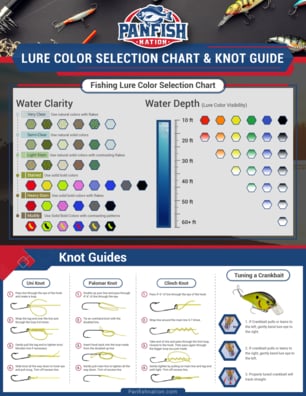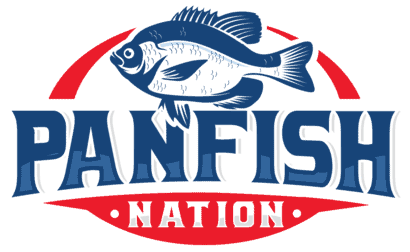Largemouth bass may be the biggest gluttons in the freshwater fishing world…I mean geez, have you seen the size of their mouths compared to their body size?
Just take a look at all the different types of lures used to catch bass…big, small, colorful, loud, and a little bizarre.
In this article, I’m going to discuss what largemouth bass eat (or more importantly, what they don’t eat)…and I think you may be shocked!
Table of Contents
What Do Bass Eat?
Largemouth Bass eat a wide variety of prey, ranging from common minnows, shiners, and other fish species to crustaceans such as crawfish, invertebrates such as worms, and even other bass.
They’ve also been known to eat some rather uncommon things too, such as baby ducklings, mice, lizards, frogs, shrimp, turtles, and even snakes!
Yes, snakes! And here is proof:
Bass have been known to eat snakes, and I learned this firsthand when I caught a nice two-pound bass and noticed something sticking out of its mouth.
After a quick inspection, turns out it was a snake…and a big one at that.
It was so big that the average sized bass could not even fit the whole snake down its mouth and it still bit my Senko worm!
This just demonstrates that largemouth bass are opportunistic and instinctual predators with a big appetite.
They will strike at nearly anything that resembles the shape, size or sound of an easy meal…even with their belly is full!
How Often Do Largemouth Bass Eat?
Surprisingly, there is not a ton of research on the frequency that largemouth bass eat.
But, we know that largemouth bass must feed often in order to sustain themselves and obtain energy.
It’s generally agreed upon that bass feed or eat every day, but the quantity of food varies greatly depending on the size of the bass, the time of year, the available forage and other factors such as weather or the spawning season.

For example, winter fishing for bass is challenging because the metabolism of largemouth bass slows down considerably. They don’t feed as often during the winter as they do during the warmer months, and there is less bait available.
Conversely, in the months after a spawning period, when largemouth bass are depleted, they may feed heavily and aggressively.
Have you ever caught a bass with a huge belly, full of food, yet it still slammed your lure? Or have you ever caught a bass that is skinny and drawn out, almost emaciated?
Both examples show the variability in largemouth bass feeding and frequency.
What Do Largemouth Bass Eat The Most?
Minnows, shiners, shad and sunfish are the most common foods eaten by largemouth bass. In most lakes, rivers and ponds these types of forage fish are plentiful and provide a natural food source for bass.
Do Bass Eat Bluegill?
Bluegill are one of the most popular foods for largemouth bass. In fact, they are so popular that many private lake and pond owners around the country stock bluegill as forage to grow big bass.
Bluegill grow rapidly, and spawn multiple times throughout the year. This makes them an ideal food source that is sustainable and affordable.
If you’ve never tried using bluegill for bass bait, give it a try! Its a ton of fun and very effective.
Note: Always check the fishing regulations in your area. Some lakes, regions and states do not allow the use of live bluegill or any sunfish as bait.
Here in Florida where I fish, its allowed as long as the bluegill is caught on a hook and line (you cannot net them, etc.)
Do Bass Eat Crappie?
Although not consumed as often as bluegill, crappie are still on the menu when it comes to largemouth bass. Particularly smaller, juvenile crappie that are often found in shallow water.
Frequently Asked Questions
Will Bass Eat Other Bass?
Largemouth bass are opportunistic predators, and that even means eating other bass.
You know what they say…It’s a ‘bass eat bass world out‘ there, eh?
Do Bass Eat Trout?
In areas where trout and largemouth bass exist, trout are definitely a popular food source. However, they both prefer different habitats so it’s not very common.
In the cold lakes and reservoirs of California, Colorado and Texas, rainbow trout are stocked to grow some of the biggest largemouth bass in the world.
Do Bass Eat Catfish?
Small catfish, such as juvenile brown bullheads, channel cats and yellow bullheads have been found in the stomach contents of largemouth bass.
As catfish get larger, they become less of a forage fish for bass. Mainly due to their pectoral spines and the fact that catfish spend most of their time along the bottom of muddy sediment, and away from bass in the middle of the water column.
Will Bass Eat Dog Food?
Dog food may be one of the more bizarre foods that I’ve heard of bass eating, but it does not surprise me.
Largemouth bass that are in small ponds can be trained to eat pelletized food (similar to dog food) but, it’s not going to be the next big fishing bait for bass.
Will Bass Eat Hot Dogs?
If I think back on my earliest memories of fishing by myself in the neighborhood ponds and canals near my house…what did I use for bait?
Hot dogs! And bread! And anything else I could get my hands on. You bet bass will eat hot dogs and tons of other strange foods too. Give it a try!
Do Bass Eat Goldfish?
Although they rarely occur in the wild, a largemouth bass would make quick work of a goldfish and eat it without hesitation.
These slow and unsuspected aquarium inhabitants have been used as bait by anglers over the years and in some states, it’s illegal to use goldfish as bass bait.
Do Bass Eat Tilapia?
In certain area of the country like Florida and Texas, Tilapia have infiltrated the local watersheds. The bad news is that these species compete with native species of fish…but the good news is that bass love them!
Learn more about using tilapia as bait for bass and other predatory gamefish.
Do Bass Eat Nightcrawlers?
Nightcrawlers, red wigglers, leeches and tons of other invertebrates are all great bass bait during certain times of the year.
And don’t think that only ‘small bass‘ will eat nightcrawlers and worms…it’s just not the case. Some of my biggest bass have been caught on a live worm under a cork!
Related: The 8 Most Common Types Of Fishing Worms (W/Pics!)
Final Thoughts
So it’s not so much about ‘what do bass eat‘…and more like, ‘what will bass NOT eat‘.
These freshwater gluttons are called bucket-mouths for a reason, because they are fearless opportunistic predators.
And that is what makes them so fun to catch, right?
I hope you learned a thing or two from this article. Thanks for reading!
If you haven’t guessed yet, I love fishing and everything about it!
To learn more about why I started Panfish Nation, visit the About page and follow along on Social Media:


Download a copy of my FREE Lure Color Selection Chart & Knot Guide!
Stay up to date with fishing reports, tackle reviews, industry news, and much more! We respect your privacy, unsubscribe at any time.
